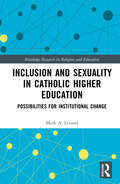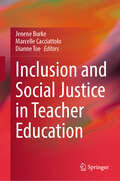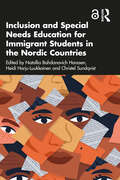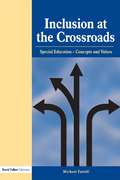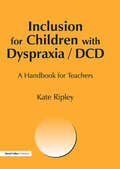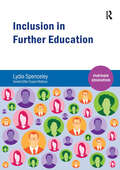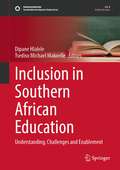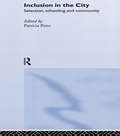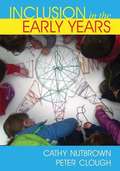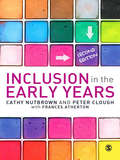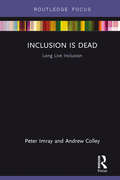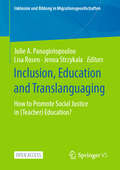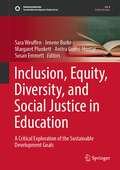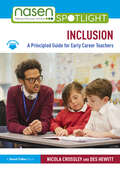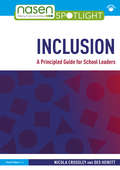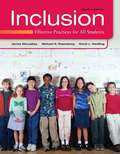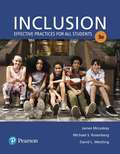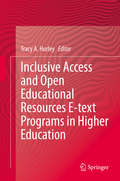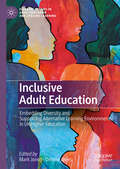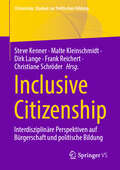- Table View
- List View
Inclusion and Sexuality in Catholic Higher Education: Possibilities for Institutional Change (Routledge Research in Religion and Education)
by Mark A. LevandDrawing on research conducted at 17 Catholic universities in the United States, making it the largest study of its kind, this volume explores effective practice in improving institutional policy relating to issues of sexuality.The text calls attention to campus cultures of fear, shame, or denial around sexuality and highlights possible points of institutional resistance to changes in policy. Discussing topics such as sexual identity, sexuality education in the curriculum, Title IX, employee termination, and morality clauses, the book shows how staff and faculty are crucial in effecting change across Catholic campuses, providing valuable insight into the “unspoken rules” around sexuality within the shadow culture at Catholic institutions. Moreover, the text illustrates how institutions can maintain fidelity to Church teachings and even embrace notions of human dignity, solidarity, and the common good to achieve sexual inclusivity.A unique study demonstrating how Catholic teaching can help support inclusive change around issues of sexuality and gender in higher education, it ultimately puts forward a practical framework for effecting change and improving student and staff support structures in Catholic institutions. It will thus appeal to researchers and academics working in the fields of Higher Education Management, Gender and Sexuality in Education, Religion, Gender and Sexuality, and the Sociology of Religion.
Inclusion and Social Justice in Teacher Education
by Marcelle Cacciattolo Jenene Burke Dianne ToeThe scholarly chapters in this edited collection come from authors undertaking social justice research within the teacher education discipline. Authors examine, explore and critique those educational practices and structures that disadvantage minority groups. With a focus on social justice and inclusion, the book concentrates on themes of equity, diversity, learning spaces and effective learning for all, examining the implications for teacher education. An array of critical traditions and methodologies that interrogate educational issues from political, cultural, structural, and social perspectives are explored. This book provides insights on building the capacities of teacher education stakeholders in teaching and learning contexts to understand and respond with equity and justice. Teacher educators, preservice teachers, practicing teachers, and other education stakeholders may find this book to be an excellent resource for developing a critical lens relating to social justice and inclusion in education.
Inclusion and Special Needs Education for Immigrant Students in the Nordic Countries
by Heidi Harju-Luukkainen Natallia Bahdanovich Hanssen Christel SundqvistInclusion for immigrant students with special educational needs (SEN) is a neglected area of research. This edited volume addresses this problem, providing up-to-date insights into the provided support and special needs education (SNE) for immigrant students in different contexts of the Nordic countries. This important book explores the diversity of student experiences, addressing both compulsory schools and vocational education, and examines how different Nordic countries conceptualise and approach support and SNE for immigrant students. Readers will get an opportunity to read various studies that address gaps in the realisation of inclusion and special need education. This book initiates a dialogue on generating new knowledge, approaches, and methods to expand the flexibility necessary to implement a fully inclusive education. The book offers research that includes strong theoretical and practical frameworks, interviews, interventions, assessments, case studies as well as offers future directions for inclusive and special needs education. By exploring the process of inclusion and special needs education in the Nordic countries, this book is an essential read for those who intend to deepen their understanding and to enact inclusion, and the development of special needs education for immigrant students.
Inclusion and Special Needs Education for Immigrant Students in the Nordic Countries
by Heidi Harju-Luukkainen Natallia Bahdanovich Hanssen Christel SundqvistInclusion for immigrant students with special educational needs (SEN) is a neglected area of research. This edited volume addresses this problem, providing up-to-date insights into the provided support and special needs education (SNE) for immigrant students in different contexts of the Nordic countries.This important book explores the diversity of student experiences, addressing both compulsory schools and vocational education, and examines how different Nordic countries conceptualise and approach support and SNE for immigrant students. Readers will get an opportunity to read various studies that address gaps in the realisation of inclusion and special need education. This book initiates a dialogue on generating new knowledge, approaches, and methods to expand the flexibility necessary to implement a fully inclusive education. The book offers research that includes strong theoretical and practical frameworks, interviews, interventions, assessments, case studies as well as offers future directions for inclusive and special needs education.By exploring the process of inclusion and special needs education in the Nordic countries, this book is an essential read for those who intend to deepen their understanding and to enact inclusion, and the development of special needs education for immigrant students.
Inclusion at the Crossroads: Special Education--Concepts and Values
by Michael FarrellAnswering challenging questions such as "Does the term SEN mean anything any more?" and "Is SEN biologically or socially determined?" this book: * Makes sense of the controversy surrounding Special Educational Needs with clear sign posted information * Is comprehensive in the range of Special Educational Needs it covers * Clarifies information with case studies
Inclusion for Children with Dyspraxia: A Handbook for Teachers
by kate RipleyThis book is about children with dyspraxia: developmental co-ordination disorders (DCD) and what teachers and other professionals can do to promote their learning and their social inclusion in a mainstream setting. The author addresses issues which affect access to the curriculum in Key Stages 1-4 and offers strategies to support children which have proved effective to experienced practitioners and can be managed in a group or class context. A key component of the book is an understanding of the emotional and social needs of children with dyspraxia.
Inclusion in Further Education (Further Education)
by Lydia SpenceleyFor all those teaching or training to teach within the Further Education (FE) sector, this book provides a critical understanding of the complex concept of inclusion and its implementation in a range of different contextual settings. It encourages the reader to revisit their own beliefs and assumptions concerning inclusion in relation to their own practice, and a range of learning features including clear objectives, case studies, critical thinking tasks and chapter reflections ensures deep understanding.The increasing importance of inclusion, and the growing provision of Higher Education courses in FE, means that an accessible book which facilitates a critical understanding of inclusion policy and develops relevant academic competence is both timely and essential.
Inclusion in Southern African Education: Understanding, Challenges and Enablement (Sustainable Development Goals Series)
by Tsediso Michael Makoelle Dipane HlaleleThis book reflects on more than two decades of adoption practices of inclusive education policy in Southern Africa. It is aimed at taking stock of the successes, challenges and achievements during this journey of making education inclusive and equitable. It responds to the educational needs of learners at all levels, regardless of their diverse needs, such as disability, gender, socio-economic status, race, ethnicity and language background.This book furthers the understanding and conceptualization of the notion of inclusion in education, and explores the challenges experienced during the operationalization and implementation of the process. It extends debates spawned by international and national policy mandates that sought to transcend exclusionary educational practices in order to realize inclusive societies and, by implication, inclusive classrooms. It offers a comprehensive conceptual framework for inclusive education in the Southern African context while drawing parallels from the regional and international experience. This book can be used as a reference or critical reading for scholars and researchers in the field of inclusive education. It will empower practitioners, administrators, teachers and school leaders, curriculum developers and planners, as well as policy makers with knowledge about theory and practice regarding inclusive education in the Southern African schooling system.
Inclusion in the City: Selection, Schooling and Community
by Patricia PottsInclusion in the City explores inclusion and exclusion in the context of policy and practice in one English city - Birmingham. Here, a commitment to redressing the inequalities experienced by many learners has been inhibited by difficulty in securing agreement to a definite policy for inclusion and, consequently, in sustaining initiatives for strengthening participation in community comprehensive education.Grounded in an understanding of inclusion as a political and moral project, the book presents a range of perspectives from policymakers and practitioners. Detailed case studies, based on research specially undertaken for this book, relate inclusion to key issues in contemporary education such as; the effects of selection by attainment; faith schools and their communities; single sex education and inclusive schools; participation in further education; and social mobility.Insightful, thought provoking and original, Inclusion in the City detaches processes of inclusion and exclusion from the language of educational reform. In so doing it highlights links between participation in education and poverty, gender and cultural background, as well as the absence of a link between urban and educational renewal.
Inclusion in the Early Years
by Cathy Nutbrown Peter CloughIn this insightful text, the authors argue for a broad definition of inclusion, not limited to those with learning difficulties or impairment. The book presents a number of original stories generated from a recent research project carried out by the authors, and shows how to apply theory to practice. This new and revised edition includes an increased focus on: -Inclusion as a political issue -Social class -Poverty -Children's rights -The inclusion of gay and lesbian parents and staff -Practical activities including workshops and role-plays -Different policies around the UK This text is essential for all Early Years students, practitioners and researchers who want to become familiar with current research into inclusion and to develop ways of drawing on such studies to inform and develop their own inclusive practices. Cathy Nutbrown is Professor of Education and Director for Research at the University of Sheffield. Peter Clough is Honorary Professor of Education at the University of Sheffield Frances Atherton is Head of Department of Early Childhood Studies, at the University of Chester.
Inclusion in the Early Years: Critical Analyses And Enabling Narratives
by Cathy Nutbrown Peter Clough Frances AthertonThis insightful text shows how the attitudes of adults in early years settings can influence practice. The authors argue for a broad definition of inclusion, not limited to those with learning difficulties or impairment, but addressing factors affecting all members of the learning community. The book shows how the lives of practitioners, parents and children have been affected by inclusive and exclusionary practices. This new and revised edition includes an increased focus on: - inclusion as a political issue - social class - poverty - children's rights - gay and lesbian parents and staff This text is essential for all early years students, practitioners and researchers who want to become familiar with current research into inclusion and to develop ways of drawing on such studies to inform and devleop their own inclusive practices. Cathy Nutbrown is Professor of Education and Director for Research at the University of Sheffield. Peter Clough is Honorary Professor of Education at the University of Sheffield Frances Atherton is Head of Department of Early Childhood Studies, at the University of Chester.
Inclusion is Dead: Long Live Inclusion
by Peter Imray Andrew ColleyInclusion is Dead is a provocative polemic against the widely held notion that inclusion for all children and young people with SEN is both possible and desirable. For those with severe learning difficulties (SLD) and profound and multiple learning difficulties (PMLD), the authors argue, it is neither. Imray and Colley assert that the dominance of inclusion has meant that there has been no serious attempt to look at the educational difficulties faced by learners with PMLD and SLD. As a vision of egalitarianism and equality for all, they say, inclusion is dead. The authors controversially believe that unless education changes, it will remain as a disabling institution that does the exact opposite of its intention. The book presents the argument that theorists of inclusion have failed to provide practical solutions on how inclusion can be achieved when SLD and PMLD learners are involved, as well as discussing the drawbacks of the ‘inclusion for all argument’. With up-to-date references throughout, Inclusion is Dead will be an insightful read for teachers and SENCO trainers, as well as postgraduates and undergraduates studying courses on politics, philosophy and society.
Inclusion, Education and Translanguaging: How to Promote Social Justice in (Teacher) Education? (Inklusion und Bildung in Migrationsgesellschaften)
by Lisa Rosen Julie A. Panagiotopoulou Jenna StrzykalaThis open access book is designed as an international anthology on the broader subject of inclusion, education, social justice and translanguaging. Prefaced by Ofelia García, the volume unites conceptional and empirical contributions focusing on various actors within educational institutions, from early childhood to secondary education and teacher training, while offering insights into multiple European and North-American educational systems.
Inclusion, Equity, Diversity, and Social Justice in Education: A Critical Exploration of the Sustainable Development Goals (Sustainable Development Goals Series)
by Margaret Plunkett Jenene Burke Sara Weuffen Anitra Goriss-Hunter Susan EmmettThis book presents an edited collection of critical discourse situated in the fields of diversity and inclusion broadly, and more specifically, within the discipline of education. Each chapter articulates the importance of educational diversity in achieving the United Nations Sustainable Development Goal 4. The edited collection presents a grounding narrative of equitable learning opportunities and experiences via interpretivist theoretical frameworks and student-centered methodologies. The combination of these approaches, combined within the strong and scholarly-informed social justice lens, reminds us, that the onus of education is to acknowledge, recognise, respect, and engage with the diverse student cohorts, learning needs, and multiple knowledges and cultures that exist in educational contexts. This edited collection creates a holistic discourse around the experiences, interrogations, and innovations occurring within education communities to foreground deeper and more holistic understanding of the intersectionality of diversity and inclusion existing within the contemporary educational settings.
Inclusion: A Principled Guide for Early Career Teachers (nasen spotlight)
by Des Hewitt Nicola CrossleyThis accessible book guides early career teachers (ECTs) through key areas of inclusion, providing context and understanding, sharing diverse reflections from practice, and introducing the essential principles of inclusive teaching.Chapters explore a range of pertinent topics and perspectives on inclusion, from our values and pedagogy to understanding behaviour and disadvantage in the classroom. Each area is aligned with the Teachers’ Standards to provide clarity on professional responsibilities and to show how inclusive practice weaves through every area of teaching. The book includes: A comprehensive overview of inclusion, with tools that can be utilised immediately Advice on adapting the curriculum and teaching to embrace inclusion Consideration of SEND and neurodiversity over time, with attention paid to reasonable adjustments to ensure all learners can thrive Recognition of the importance of culture and community, with guidance on working effectively with families to best support pupils Illustrative think pieces written by ECTs to bring theory to life and stimulate debate and reflection. With accompanying infographics included to summarise key themes, this valuable book places inclusion at the core of high-quality teaching and ensures all ECTs are supported to be the best they can be in an ever-changing world. It is essential reading for all early career teachers, as well as trainee teachers and teacher training providers.
Inclusion: A Principled Guide for School Leaders (nasen spotlight)
by Des Hewitt Nicola CrossleyThis valuable and accessible guide navigates school leaders and those in training through a number of key areas of inclusion, providing context and understanding, helpful definitions, examples of leadership in action, and ten essential principles of inclusive leadership. Inclusion: A Principled Guide for School Leaders discusses what a culture of inclusion should look like: in classes, in schools, and in the education sector more widely. Each chapter acts as a think piece to stimulate debate, to reflect upon the purpose of education, and to ask how far we have come in embracing inclusion. The book also offers suggested actions for principled leaders and illustrative case studies to bring the theory to life, taken from a range of schools and spanning a wide number of topics, including: Inclusive Learning Partnerships with Learners and Families Special Educational Needs Disadvantage and Socio-Economic Poverty Culture, Language and Ethnicity This book explores a variety of issues in inclusion, highlighting the implications for school leaders and offering an approach to develop learning for marginal groups through effective strategic leadership. It will be essential reading for SENCOs, middle and senior leaders, but equally of interest to those who aspire to be inclusive leaders of the future.
Inclusion: Effective Practices For All Students
by Michael S. Rosenberg James McLeskey David L. WestlingBalancing foundational information with a real world approach to inclusion, Inclusion: Effective Practices for All Students, 2e equips teachers to create effective inclusive classrooms. The most applied text in the market, this second edition sharpens its focus and its organization to more clearly outline best practices for inclusive classrooms. The book's three part structure opens with the foundational materials you'll need to truly understand inclusive classrooms, followed by brief categorical chapters to give you the information you need to meet the needs of all students. Finally, field tested and research based classroom strategies are laid out on perforated pages to make the transition from theory to practice seamless.
Inclusion: Effective Practices for All Students
by Michael S. Rosenberg James McLeskey David L. WestlingInclusion: Effective Practices for All Students examines the foundations of successful inclusion; provides information on how to meet the needs of all students in brief, cross-categorical chapters; and offers effective, field-tested, evidence-based practices to help teachers make a seamless transition from theory to practice in the classroom. This new third edition includes Deepen Your Knowledge features; a full chapter on students from culturally and linguistically diverse backgrounds; and new chapters on effective strategies for addressing the needs of students with severe disabilities, effective strategies for providing effective mathematics instruction for students in inclusive classrooms, and the four key pillars associated with successful implementation of inclusive practices. Also included are 68 step-by-step strategies for improving outcomes for students with disabilities and others who struggle in school.
Inclusive Access and Open Educational Resources E-text Programs in Higher Education
by Tracy A. HurleyThis volume takes a comprehensive and broad look at e-text programs across a wide spectrum of programs, institutions, and policies in three parts. The first part showcases several policy papers to contextualize the discussion and highlight the reasons for IAE programs’ structure and the obstacles they face for implementation. The second part is an in-depth exploration of various case studies that provide a detailed description of IAE programs, including information about program elements, program structure, program size, and insights into how programs are operationalized, and their shortcomings and benefits to students and stakeholders. The final part is a selection of research papers that offer evidence-based support for the adoption of IAE programs in terms of student success, access, engagement, costs, and a variety of other student and institutional outcomes. There are approximately 300 institutions of higher education that currently have some form of Inclusive Access or Open Educational Resources E-text (IAE) program in the United States, but there is little scholarship that engages on the topic of assessing these programs’ effect on student success. The results of the research studies included in this volume will inform faculty, administrators, and policy-makers who seek to support the development, adoption, and implementation of IAE programs based on their potential positive effects on student success and other outcomes.
Inclusive Adult Education: Embedding Diversity and Supporting Alternative Learning Environments in UK Higher Education (Palgrave Studies in Adult Education and Lifelong Learning)
by Mark Jones Debbie JonesThis book offers critical discussion of developing inclusive theory, practice, and policy that supports the needs and experiences of adult learners within higher education settings in the UK. The first part of the book shares the research of authors, all who have lived experience of their area of expertise, and the experiences and needs of adult learners in relation to religion, ethnicity, gender, sexuality, and disability as well as including an intersectional lens. The second section of the book discusses practice and understandings of adults learners in non-conventional higher education settings within the police service, criminal justice, and health care. These contributions provide new knowledge to better support those from diverse backgrounds to thrive in the higher education environment. This book will be of interest to academics who teach/support adult learners, students of education, as well as practitioners who work outside traditional higher education settings such as community educators and policymakers.
Inclusive Citizenship: Interdisziplinäre Perspektiven auf Bürgerschaft und politische Bildung (Citizenship. Studien zur Politischen Bildung)
by Dirk Lange Malte Kleinschmidt Frank Reichert Steve Kenner Christiane SchröderInclusive Citizenship ist ein Konzept, das in diesem Band theoretisch und empirisch in den Blick genommen wird. Die Autor*innen betrachten Citizenship und Inklusion als soziale Praktiken aus verschiedenen Perspektiven und in verschiedenen gesellschaftlichen Feldern wie Gender und Migration, Lernen und Bildung, Digitalisierung, Medizin und Kulturerbe. Anhand von vielen empirischen Beispielen und theoretischen Impulsen wird so das Konzept geschärft, mit dem die inkludierenden und exkludierenden Aspekte von Citizenship ebenso in den Blick kommen wie die Dimensionen Status und Performativität.
Inclusive Classrooms: Video Cases on CD-ROM Activity and Learning Guide to accompany Exceptional Lives Special Education in Today's Schools
by Anne M. Bauer Stephen D. KroegerSkills and knowledge for creating inclusive classrooms.
Inclusive College Classrooms: Teaching Methods for Diverse Learners
by Lauren S. Cardon Anne-Marie WomackInclusive College Classrooms provides instructors with research-based practices and tools to create an effective and inclusive classroom environment. Filling a visible gap in pedagogical training, this important book responds to current barriers to inclusion in higher education by helping instructors improve the methods they are already using and identify new methods that could enhance their courses. The inclusive approach in this book is informed by critical pedagogy, universal design for learning, and intersectional social justice pedagogies. The authors identify practices in education that exclude historically marginalized groups and outline teaching strategies that can create more inclusive classrooms, where all students can feel heard and represented. This timely volume is packed full of hundreds of example lessons from across a range of disciplines, tips for moving classes online, questions to generate dialogue about various methods, and appendices on lesson planning. With this book in hand, instructors can continually adapt and revise their pedagogy to be more inclusive and effective.
Inclusive Collegiality and Nontenure-Track Faculty: Engaging <B>All Faculty</b> as Colleagues to Promote Healthy Departments and Institutions
by Jenny Jacobs Nathan F. Alleman Cara Cliburn Allen Don HavilandThis book focuses on the status and work of full-time non-tenure-track faculty (NTTF) whose ranks are increasing as tenure track faculty (TTF) make up a smaller percentage of the professoriate. NTTF experience highly uneven and conditional access to collegiality, are often excluded from decision-making spaces, and receive limited respect from their TTF colleagues because of outdated notions that link perceived expertise almost exclusively to scholarship. The result is often a sub-class of faculty marginalized in their departments, which reduces the inclusion of diverse voices in academic governance, professional relationships, and student learning. Given these implications, the authors ask, how can departments, institutions, and the profession do more to engage NTTF as full and active colleagues? The limited access of NTTF to the rights and responsibilities of collegiality harms institutional success in several ways. Given the full-time nature of their work and the heavy (but not exclusive) focus on instruction, NTTF are likely to be on campus as much or more than TTF, and thus be engaged with students, colleagues, and administrators in ways that more closely resemble TTF than part-time faculty. Their limited access to collegial spaces makes it harder for them to do their jobs by restricting access to information and input into decision-making. Moreover, since the greatest growth among women faculty and faculty of color is in NTTF roles, their exclusion from collegiality and decision-making negates the very diversity the profession claims to seek. Finally, colleges and universities face financial, curricular, and organizational challenges which require broad input, although the burden of governance is falling on fewer shoulders as the percentage of TTF declines and NTTF are excluded from these spaces.Ultimately, NTTF must be engaged as partners and colleagues in supporting institutional health. This book – the fruit of extensive data collection at two institutions over a five-year period – describes lessons learned from and benefits experienced by departments that have successfully supported and engaged NTTF as colleagues. Drawing on their research data and analysis of “healthy” departments that integrate NTTF, the authors identify the practices, policies, and approaches that support NTTF inclusion, shape a more positive workplace environment, improve morale, satisfaction, and commitment, and fully leverage the expertise of NTTF and the valuable human capital they represent. The authors argue that this more inclusive collegiality improves governance, supports institutional success, and serves diverse institutional missions. Though primarily addressed to institutional leaders, department chairs, tenure-line faculty, and leaders in the academic profession, it is hoped that the findings will be useful to NTTF who are engaged as advocates for and partners in the change process required to address the evolving structure of the university faculty.
Inclusive Computing Education in the Secondary School: Linking Theory and Practice
by Eleanor Overland Louise HayesUnderpinned by pedagogical practices and theories of what works in teaching computing, this book gives existing and new teachers ideas to enable them to plan an inclusive curriculum for the secondary school computing classroom. Computing is one of the fastest-developing subjects in the curriculum, and computing teachers will always be updating their subject knowledge and pedagogical approaches. Each chapter explores a specific aspect of inclusion and potential barriers faced by students and is designed to challenge teachers to think about their own practice and curriculum design. Themes include the influence of classroom environments, bias in the use of data, collaborative learning, building cultural capital, and racism within AI applications. The book is also laced with practical ideas to develop teaching shared by a wealth of experienced practitioners, researchers and industry professionals. Written with consideration for the National Curriculum for Computing, this valuable text will give trainee teachers, recently qualified teachers, and experienced teachers the confidence and knowledge they need to successfully deliver an inclusive computing curriculum in the classroom.
